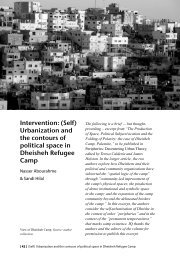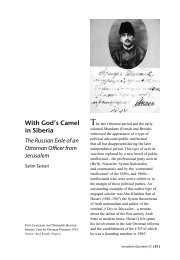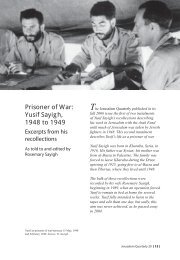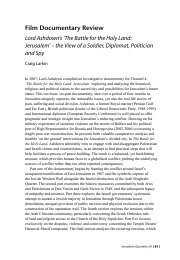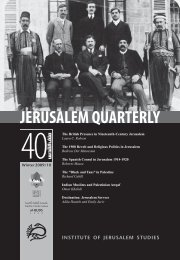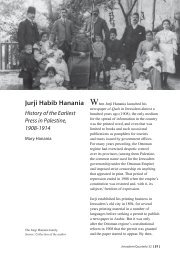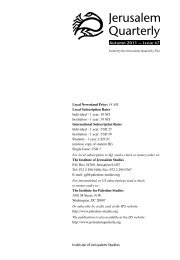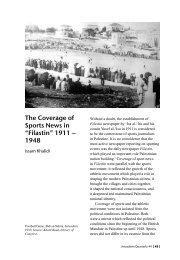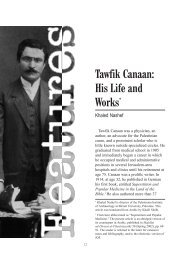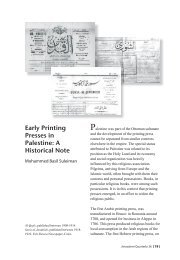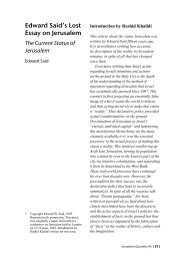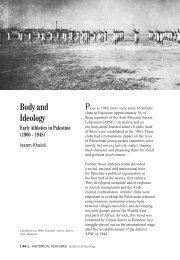PLUNDERING PALESTINE - Jerusalem Quarterly
PLUNDERING PALESTINE - Jerusalem Quarterly
PLUNDERING PALESTINE - Jerusalem Quarterly
Create successful ePaper yourself
Turn your PDF publications into a flip-book with our unique Google optimized e-Paper software.
<strong>Jerusalem</strong> Diary<br />
December 2007 – March 2008<br />
In 1967, when Israel occupied previously<br />
Jordanian-controlled eastern <strong>Jerusalem</strong>, it<br />
took control of a city that was 26 percent<br />
Palestinian and 74 percent Jewish. Forty<br />
years later, the Palestinian population<br />
in the city has risen to 34 percent, due<br />
largely to a higher birth rate.<br />
Israel has worked hard to maintain<br />
demographic and geographic control<br />
over the city it annexed as its capital. It<br />
expanded the city’s boundaries and is<br />
putting massive investment into Jewish<br />
settlements in order to beat back inching<br />
Palestinian growth. In 2005, <strong>Jerusalem</strong><br />
was home to 245,000 Arabs and 475,000<br />
Jews, 184,000 of the latter living in<br />
settlements considered illegal under<br />
international law. (More recent numbers<br />
put the settlement population at 210,000.)<br />
Since Palestinians and Israelis kicked<br />
off talks in Annapolis, Maryland<br />
in November, Israel has escalated<br />
settlement construction in <strong>Jerusalem</strong>,<br />
according to a recent report by the Ir<br />
Amim organization. Over 9,500 housing<br />
units for Jews have been constructed,<br />
471 of them in the heart of Palestinian<br />
population centers. In addition, Israel has<br />
announced tenders for 1,550 units in four<br />
separate settlements within the redrawn<br />
<strong>Jerusalem</strong> boundaries.<br />
These moves contradict Israel’s<br />
commitments to stop settlement<br />
construction under the road map, the<br />
basis for the US-sponsored Annapolis<br />
talks. The road map plan for peace was<br />
first endorsed in 2003 by the United<br />
States, European Union, Russia and<br />
United Nations.<br />
Palestinian officials have protested the<br />
new building to no avail. Palestinian<br />
Authority efforts to counteract settlement<br />
by designating the city an Arab cultural<br />
capital have been broken up by Israeli<br />
police, and its organizers detained. One<br />
civil society organization canceled a<br />
conference to be held in the city after it<br />
was notified that no Palestinian events in<br />
<strong>Jerusalem</strong> were being allowed to proceed.<br />
Meanwhile, Palestinian neighborhoods in<br />
<strong>Jerusalem</strong> suffer from systemic neglect.<br />
Almost 90 percent of the city’s sewage<br />
networks, roads and sidewalks are found<br />
in the city’s western side for the use of<br />
Jewish residents, says the human rights<br />
group B’Tselem.<br />
Since 1967, Israeli officials have planned<br />
no new Arab neighborhoods in eastern<br />
<strong>Jerusalem</strong>. Construction permits are<br />
expensive and difficult to obtain and<br />
unlicensed structures are threatened with<br />
demolition. In March alone, city officials<br />
demolished four unlicensed Palestinian<br />
structures in <strong>Jerusalem</strong> and its Arab<br />
suburbs.<br />
<strong>Jerusalem</strong> <strong>Quarterly</strong> 31 [ 83 ]



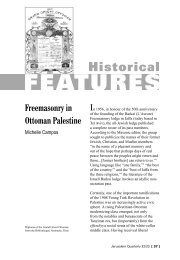
![In Search of Jerusalem Airport [pdf] - Jerusalem Quarterly](https://img.yumpu.com/49007736/1/180x260/in-search-of-jerusalem-airport-pdf-jerusalem-quarterly.jpg?quality=85)
